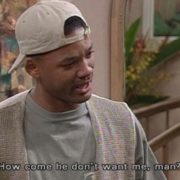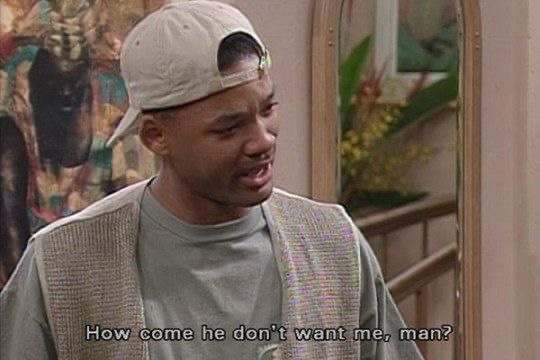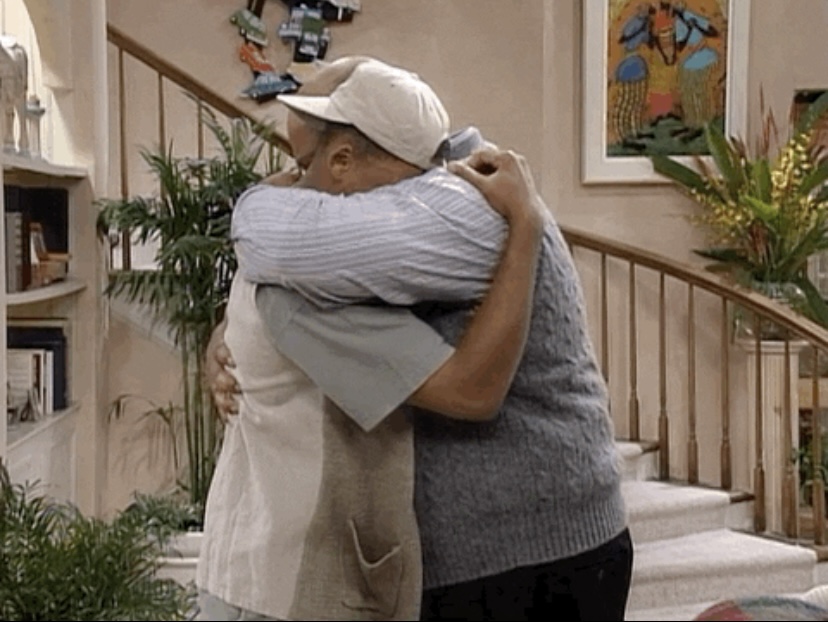‘How come he don’t want me, man?’The importance of Black Fathers in the primary socialisation of their sons.

Theories on the ‘Absent Black Father’ concept are conflicted; some propose that it is a significant issue in our community- even if a child’s father is financially involved and may occasionally spend time with them, it’s not equivalent to being actively present.
Contribution by Daniella Taresa.

Precious and painful. On the 9th of May 1994, one of The Fresh Prince of Bel-Air’s most emotionally charged episodes aired. Nearly three decades later, this scene is praised as an honest portrayal of the heartbreak endured by children who are abandoned by one of their parents, specifically a son by his father. Through cloudy eyes we watched as the protagonist Will Smith confided in his uncle Phil (James Avery), relinquishing forged disdain and intense despair about his father Lou’s (Ben Vereen) abrupt departure, which came after spending years separated and shortly reuniting.
Primary socialisation is the process by which parents teach the culturally accepted values and behaviours of society to their infants- naturally, two people contributing to this vital function of the family unit are better than one. In the 90s sitcom, Will is raised by his single mother before moving in with his rich aunt and uncle, following a troublesome decision he made. Though the show is fiction, it is heavily based on authentic experiences and aligns with the stories of many black children growing up in low socioeconomic areas; from a young child with limited or no contact with their father to a rebellious adolescent turned resentful adult.
The Statistics
Combined with the fact that 90% of all single parents with dependent children are women, it is suggested that many infants are deprived of the initial nurturing that the male parent would provide. While the severity of this circumstance varies from having no connection with one’s father to seeing him regularly, neither degree supersedes an ‘in-house dad’.
This experience affects girls and boys differently; growing up as the daughter of a single mum with my brothers, I observed the disparity between how our needs were met. I was privileged enough to learn almost everything about womanhood from our mum however, my siblings were not as fortunate. Despite the distance, we were blessed enough to be supported and loved by our dad, who we saw regularly, but still- navigating masculinity without a healthy paternal presence, harbouring lived experience and wisdom, places the sons of single mothers at a disadvantage.
The Myth of the Absent Black Father
Theories on the ‘Absent Black Father’ concept are conflicted; some propose that it is a significant issue in our community- even if a child’s father is financially involved and may occasionally spend time with them, it’s not equivalent to being actively present. Others describe it as a lie, carefully constructed to demonise black men, instead of the systems perpetually working against us. I believe the answer is at the intersection of both thoughts.
To progress, we must identify any contributions we make to our adversities. For example, more weight should be placed on maintaining stable relationships before having children and less on the glorification of infidelity, which is the highest cause of separation in couples, within black pop culture. We must also acknowledge the institutional factors that affect children beyond the family in school/greater society and how the absence of a father can make his son less equipped to challenge them.
The Wills of today
Media outlets are platforms for black artists to expose the context of their childhoods, consequentially the basis of their present-day character. Music, TV, literature- it’s possible to find the ‘my father left me, and it made me who I am’ narrative in any art form, particularly that composed by black men and boys. In this scene, Will disguises his hurt under a prideful façade, listing all the accomplishments he made without his dad. His heart-wrenching performance speaks for thousands of children who pretentiously celebrate the absence of their dad, simultaneously burying the trauma it caused.
Those who grow up without an influential male role model at home tend to look outwards for inspiration and validation. Once the critical stage of character development passes (ages 1-5), the child advances to secondary socialisation, where social agents like schools, peer groups, and religious bodies instill universalistic values. At school, children are subject to teacher expectations, labeling from both staff and students, and peer pressure to conform, all of which are fundamental in the formation of their identity. Without the mentoring of a father figure, boys are more likely to submit to the influence of others.
When there is a gap where a second parent should be, there’s room for misdirection. Many young men blame their defiance of rules and lack of discipline on low parental involvement and affection. This can manifest as disruptive behavior in class, rule-breaking, and little regard for authority. On the very end of the spectrum, gang members have confessed to becoming affiliated with deviant groups hoping to compensate for the compassion withheld from them.
The Lous of Tomorrow

It is undeniable that other elements can play into the outcome of a child’s life, but recognising this common feature provokes the question: does the absence of a father impact their son that much?
Sometimes, leaving is for the greater good. Otherwise, it might be inevitable. What’s paramount is the effort made as a father to be one, especially from the early stages. An infant’s first method of learning is imitation, so just seeing their father there for them (even if it’s only part-time) teaches a virtue only actions can convey. That’s where Lou failed. He selfishly fled from his responsibility at the expense of Will’s emotional wellbeing, contrasting the honourable qualities of a good dad that are demonstrated by Uncle Phil.
Opposite to circumstances mentioned earlier, children with strong domestic support systems and uplifting parental attitudes are more likely to apply the ethics taught at home rather than be easily swayed by the suggestions of friends or defined by the pre-conceived (based on race, gender or ability) standards of authorities. Along with guidance, tenderness from a father is extremely crucial in countering the way young black boys are conditioned and teaching valuable principles such as healthy levels of masculinity, sensitivity towards others and high aspirations. The opportunity to love and be loved by their dad ultimately reflects the way they perceive themselves, in turn, the actions they project.
So yes. It impacts a child’s life that much.
Contribution by Daniella Taresa.
Check out the GUAP Arts & Culture section, to discover new art, film, and creative individuals.





![ZINO VINCI’S ‘FILTHY & DISGUSTING’EP BRINGS YOU TO THE CORE OF THE ARTIST [@ZinoVinci]](https://guap.co/wp-content/uploads/2023/10/Zino-4.jpg)





![Remel London’s [@Remel_London] “Mainstream” is a must attend for upcoming presenters!](https://guap.co/wp-content/uploads/2017/02/REMEL-LONDON-FLYER-FINAL-YELLOW-COMPLETE-1.png)